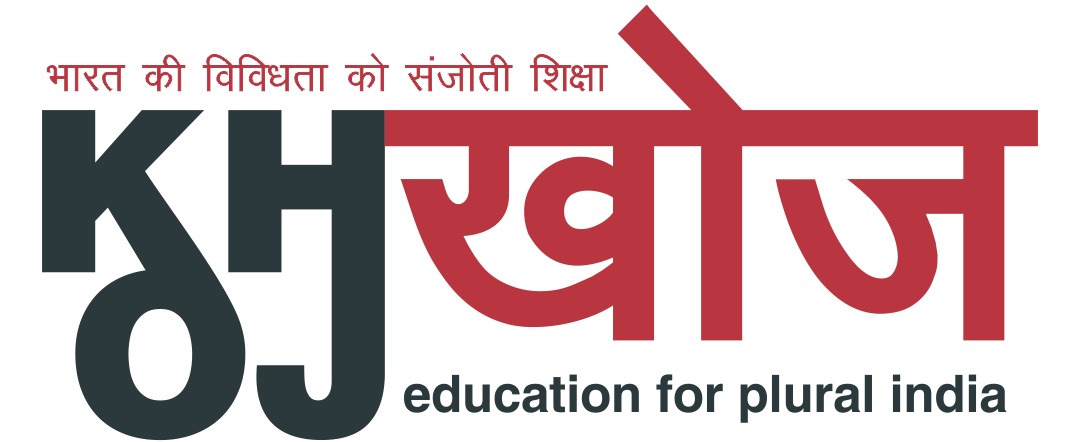About Us
In their constant effort to find answers and solutions to these clueless circumstantial conditions, children wanted to ask questions. KHOJ was founded recognizing the absolute stipulation to accept and appreciate the real identity of our people, all people, irrespective of their creed, caste and religion. Since 1994, the year of its foundation, it has been the main objective of KHOJ to explore the dilemma, misunderstandings and contradictions of our little hearts in a doubt free environment where they are encouraged to debate and discuss in an intensive and non-formal interaction on the issues of past, present and future that concern us all. Our experience has taken us into a variety of unexplored areas in the school curriculum. We found out that the best of schools have not been able to deal with the personal background of the individual child and his or her sense of collective identity, to a great extent.
We at KHOJ try to explore who we are and what we are. We ask questions, search, discover and explore through different modules, taking the help of students of ten, eleven and twelve years of age and their teachers. In the first module, we asked our children to draw/caricature images of themselves, a self-portrait ; to make portrays of the persons in their lives who matter most to them, and a list of persons, things or events that they like or dislike. After the initial curiosity about the need for such an exercise, the children were quite enthusiastic except when it came to expressing things or emotions that they “disliked”. A student of Std V clearly said, “I hate to dislike”.
Two different follow-up exercises were then undertaken. In the first exercise, we suggested an entire self-portrait with the class. Some students were distinctly uncomfortable in sharing something they considered private. However, they were reassured and ready to participate only after making it clear to them that the exercise would apply to everyone in the class about sharing their thoughts. In the second follow-up, neighbours in the class (without looking at the original self-portrait) wrote behind it their impression about the person who had conceived his / her own portrait. Then these impressions, sometimes conflicting and varied were discussed. Often they resulted in outbursts, “but that’s not what I’m like”, or “that’s not what I think or feel”. We cannot share those here as we promised them to be confidential; however, we would be happy to share and exchange them with schools or individual teachers in more inclusive interactions. The idea is to emphasise the possible disparities in how we perceive and think of ourselves and what others think about us.
We believe in KHOJ that a thorough knowledge of History of the people associated with the land is significant in order to understand the cultural practices. It is imperative that we may not be able to find answers to all questions; however, it is important that we develop a thorough idea about ourselves, our families, neighbourhoods, our village, town or the city, eventually crossing the topographical boundaries of countries. This has been our attempt at KHOJ for last 17 years.
We often feel the restriction imposed on us by the architectural structures of the urban educational system that cram large number of students behind rows of desks, defying the very proportion of students each classroom should have for a teacher to manage the teaching session properly. Still, we have tried to break through the barrier of physical confinement by introducing new methods to the children to express their inner spirits. Paintings, line and color drawings and Music have all been parts to have the children expressed their genuine emotion and perception of the environment they live in. As a KHOJ enthusiast, a ten year old from Std V described his experience after the first sessions of KHOJ, “This is a class where we have to talk about our feelings.”
We respect children’s feelings and in our attempt to honour that, we introduce topics of discussion that are very exciting for the children while the teachers have been confused to ask us, “But will not such steps lead to a very noisy classroom?” We answer, “Yes, but it’s the right kind of noise”.
KHOJ has been a collective journey of dedicated individuals who believe that sensitively and creatively handled young children can cope with issues of difference and conflict equal or better than adults. THE KHOJ pedagogical orientation and approach has been critical in the evolution of the new NCERT textbooks at the national level. KHOJ was among the first to theoretically analyse and build a nationwide advocacy platform on the narrowing down of the Indian History and Social Studies syllabus. Over two dozen individuals have been proved to be assets of the core team of KHOJ with their vibrant and enthusiastic approach for an eternal quest of life.
ABOUT CJP

Minority Rights – Rights of religious, ethnic, caste, gender and sexual minorities as well as persons with disabilities.
Freedom of Expression – A healthy and vibrant democracy always respects free expression and the dignity of different belief systems, cultures and languages. Hate speech, we believe, is an abuse of this freedom.
Criminal Justice Reform – CJP believes that our agencies – investigation, prosecutorial and judicial – need further democratisation to ensure both, quality and quick justice delivery.
Child Rights & Education – CJP works to inculcate pluralism and Constitutional values in young minds. We also work in the field of Juvenile Justice Reform and protection of children from Sexual Abuse.
All our campaigns are aimed at empowering the disempowered and defending their rights and freedoms, so that all Indians may live in peace and with dignity.
